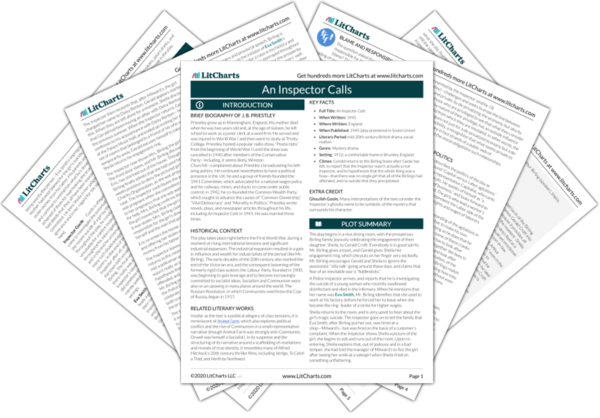Wealth, Power, and Influence
The Birlings are a family of wealth and power, who take pride in their high social position. Mr. Birling is a successful businessman, and the family inhabits a nice home with a maid (and likely other servants). The play begins with the family celebrating and feeling generally pleased with themselves and their fortunate circumstance. Throughout the Inspector’s investigation, however, it comes out that several of the Birlings have used their power and influence immorally…
read analysis of Wealth, Power, and InfluenceBlame and Responsibility
The question asked throughout the play is: who is responsible for the suicide of Eva Smith? Who is to blame? The arc of the play follows the gradual spreading of responsibility, from Mr. Birling, to Mr. Birling and Sheila, to Mr. Birling and Sheila and Gerald, and so on and so forth. Each of the characters has different opinions about which of them is most responsible for the girl’s suicide. Mrs.…
read analysis of Blame and ResponsibilityPublic versus Private
The Inspector, and the play at large, challenges the “privacy” of the private sphere, by revealing that actions that the family may have conceived of as private and personal really have an effect beyond themselves and their family. For example, Sheila’s revelation that Eric drinks more than his parents had thought—“he’s been steadily drinking too much for the last two years”— seems like private information but turns out to have a greater effect…
read analysis of Public versus Private
Class Politics
Mr. Birling describes the politics of the day as revolving around “Capital versus Labor agitations.” Mr. Birling is a representative Capitalist, who cares only about his company’s profit. He speaks of himself as “a hard-headed, practical man of business,” and looks forward to the prospect of being knighted. The girls who lead a worker’s strike in his factor, meanwhile, represent the Labor side of the conflict in trying to improve the rights and wages of…
read analysis of Class PoliticsMorality and Legality
The play interrogates the way that people construct, construe, and apply their moral values, especially in relation to legality and illegality. Do actions have moral consequence in themselves, or in relation to their effects on other people; or can we only measure morality in relation to legal rulings? When the legal consequences of the truths revealed by the Inspector’s questioning have been removed (through the revelation that the Inspector is not, in fact, an inspector)…
read analysis of Morality and Legality






